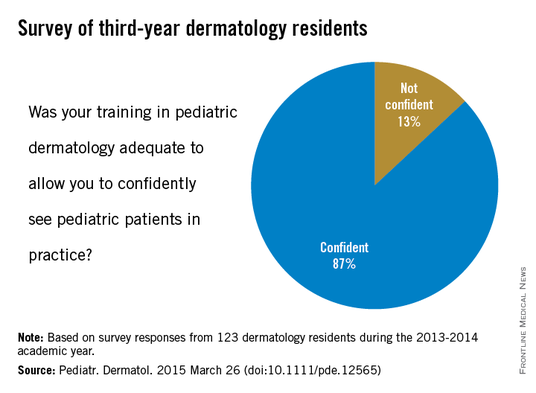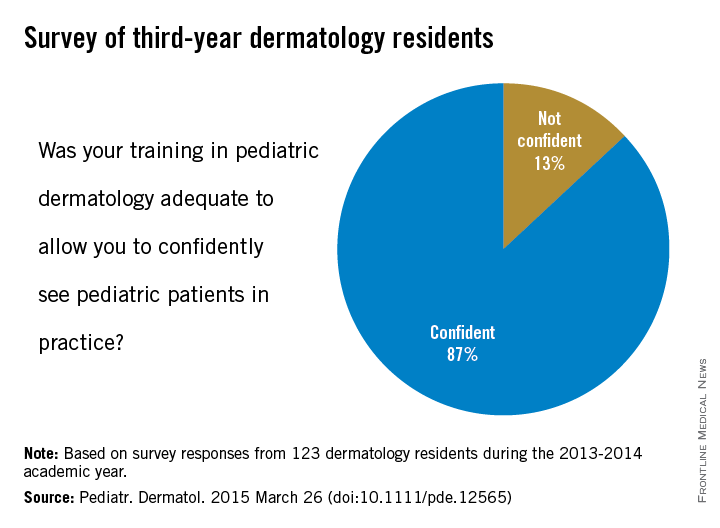User login
In a survey of last year’s graduating dermatology residents, most said that their training had adequately prepared them to confidently treat pediatric patients, according to a report in Pediatric Dermatology.
Of the 123 respondents to the survey, 87% expressed confidence in their pediatric dermatology training, and 13% said that they were not confident, said Dr. Alaleh Akhavan of Albert Einstein College of Medicine, New York, and her associates (Pediatr. Dermatol. 2015 March 26 [doi:10.1111/pde.12565]).
This high level of confidence may be the result of the didactic experience reported by the residents: 56% said that “their program offered academic time specifically dedicated to pediatrics,” and 80% of “those with dedicated pediatric academic time had pediatric dermatologists leading the majority of their didactic sessions,” the investigators wrote.
When asked about their clinical experience, 82% of the residents said that their program had a dedicated pediatric dermatology clinic, and 69% reported that they had attended more than one clinic per week that was dedicated to pediatric patients – almost 40% put the weekly number at four or more, Dr. Akhavan and her associates reported.
Although most of the “residents are satisfied with their pediatric dermatology education … there appear to be deficiencies in pediatric excisional surgery and genodermatoses management. A standardized curriculum may facilitate further enhancements in pediatric dermatology training and exposure,” they concluded.
The investigators did not disclose any conflicts of interest.

In a survey of last year’s graduating dermatology residents, most said that their training had adequately prepared them to confidently treat pediatric patients, according to a report in Pediatric Dermatology.
Of the 123 respondents to the survey, 87% expressed confidence in their pediatric dermatology training, and 13% said that they were not confident, said Dr. Alaleh Akhavan of Albert Einstein College of Medicine, New York, and her associates (Pediatr. Dermatol. 2015 March 26 [doi:10.1111/pde.12565]).
This high level of confidence may be the result of the didactic experience reported by the residents: 56% said that “their program offered academic time specifically dedicated to pediatrics,” and 80% of “those with dedicated pediatric academic time had pediatric dermatologists leading the majority of their didactic sessions,” the investigators wrote.
When asked about their clinical experience, 82% of the residents said that their program had a dedicated pediatric dermatology clinic, and 69% reported that they had attended more than one clinic per week that was dedicated to pediatric patients – almost 40% put the weekly number at four or more, Dr. Akhavan and her associates reported.
Although most of the “residents are satisfied with their pediatric dermatology education … there appear to be deficiencies in pediatric excisional surgery and genodermatoses management. A standardized curriculum may facilitate further enhancements in pediatric dermatology training and exposure,” they concluded.
The investigators did not disclose any conflicts of interest.

In a survey of last year’s graduating dermatology residents, most said that their training had adequately prepared them to confidently treat pediatric patients, according to a report in Pediatric Dermatology.
Of the 123 respondents to the survey, 87% expressed confidence in their pediatric dermatology training, and 13% said that they were not confident, said Dr. Alaleh Akhavan of Albert Einstein College of Medicine, New York, and her associates (Pediatr. Dermatol. 2015 March 26 [doi:10.1111/pde.12565]).
This high level of confidence may be the result of the didactic experience reported by the residents: 56% said that “their program offered academic time specifically dedicated to pediatrics,” and 80% of “those with dedicated pediatric academic time had pediatric dermatologists leading the majority of their didactic sessions,” the investigators wrote.
When asked about their clinical experience, 82% of the residents said that their program had a dedicated pediatric dermatology clinic, and 69% reported that they had attended more than one clinic per week that was dedicated to pediatric patients – almost 40% put the weekly number at four or more, Dr. Akhavan and her associates reported.
Although most of the “residents are satisfied with their pediatric dermatology education … there appear to be deficiencies in pediatric excisional surgery and genodermatoses management. A standardized curriculum may facilitate further enhancements in pediatric dermatology training and exposure,” they concluded.
The investigators did not disclose any conflicts of interest.

FROM PEDIATRIC DERMATOLOGY
